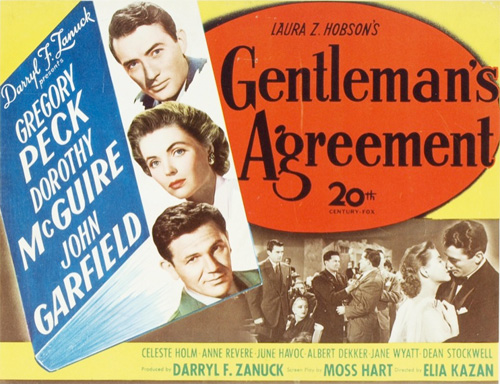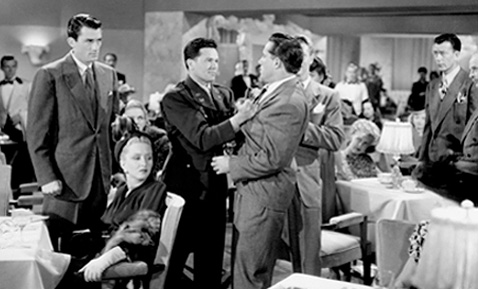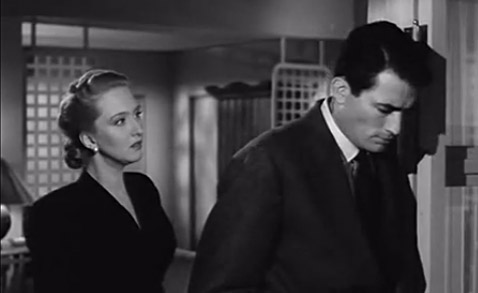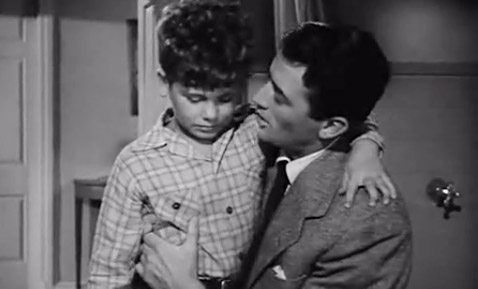It’s Oscar Week, so today we’re taking a look at some of the past Best Picture films from each decade from the 20s to the 90s. With some help from my friends, below are a list of reviews they’ve selected from each decade.
 sss • Ruth – Gentleman’s Agreement (1947) • Iba @ I Luv Cinema – An American in Paris (1951) • Paula @ Paula Cinema Club – The Apartment (1960) • Michael @ It Rains… You Get Wet – The Godfather (1972) • Ronan @ Filmplicity – Rain Man (1989) • David @ Never Too Early Movie Predictions – Shakespeare in Love (1998) sss |
Thanks to Iba, we’ve also got some Honorable Mentions from the 20s and 30s, see below:
1920s (Wings, 1927/8)
There is not much on offer for the span of the decade since the Academy Awards only began in 1927/8. So let’s take a look at that first awards ceremony. The WWI silent epic “Wings” took home the prize for Best Production (Picture). The William Wellman masterpiece, with its groundbreaking footage of in-the-air fighter plane battles is the first and only silent film to receive the Academy’s highest honor (this of course may soon change).
But wait, there is more; another film “Sunrise”, received an award for Best Picture (Unique and Artistic Picture/Artistic Quality of Production). This was the first and only year in which there were two separate categories for best picture. “Sunrise”, directed by F.W. Murnau, was the famed German expressionist’s first Hollywood feature and is considered by many to be one of the greatest films of all-time.
There is also symmetry with the Awards and the dawning of a new era in the motion picture industry. This first year of industry wide recognition for excellence in film production coincided with the advent of sound. As such, although Al Jolson’s “The Jazz Singer” was released in 1927, the Academy deemed it ineligible as it was claimed that its revolutionary use of sound gave it an unfair advantage.
Another major snub of this year was the Buster Keaton classic “The General.”
…
1930s (The Life of Emile Zola, 1937)
It is far too easy to mention the Golden Year of Hollywood, 1939 as one enters a discussion of one year to focus on in the decade. That year is the stuff of legend. It should be noted, however that the excellence in filmmaking goes beyond that one isolated ‘magical’ year. Overall the decade produced a bounty of escapist entertainment for the masses.
So let’s take a look at another year in the decade that produced equally stunning pictures – 1937. The winner of the Best Picture prize was the Warner Brothers’ biopic “The Life of Emile Zola,” starring Paul Muni as the crusading activist involved in the 19th century “Dreyfus Affair” in France. During the heyday of the studio system, Warner Brothers was the studio with the reputation of being the “socially conscious,” “realistic” studio; the win in this category marked the studio’s first win for Best Picture.
Zola beat out a diverse offering of films which included “The Awful Truth”, “Captains Courageous”, “Dead End”, “The Good Earth”, “In Old Chicago”, “Lost Horizon”, “One Hundred Men and a Girl”, “Stage Door”, “A Star is Born.”
Notable snubs from this year included the Garbo tearjerker “Camille”, the screwball comedy “Nothing Sacred” and Disney’s first full-length animated feature “Snow White and the Seven Dwarfs.”
…
Gentleman’s Agreement (1947)

Director: Elia Kazan
Screenplay: Moss Hart, based on the novel by Laura Z. Hobson
Cast: Gregory Peck, Dorothy McGuire, John Garfield, Celeste Holm, Anne Revere
Before I get to my in-depth review, I just want to share some interesting tidbits about this film. From the Gregory Peck’s biography by Gary Fishgall, it’s noted that this film was so controversial in its day that even major Hollywood moguls such as Samuel Goldwyn and Louis B. Mayer who are Jewish did not want this film to be made, not wishing to ‘rock the boat’ and prefer to deal with the matter quietly. In fact, they pleaded with Darryl Zanuck (who is NOT wish) to abandon the project. Even some of Peck’s fans and his own agent encouraged the actor to refuse the part. This film was also the first time the word “Jew” was used explicitly in a mainstream film. Well, this film not only won Best Picture and Best Director for Elia Kazan, but is also the highest-grossing picture of 1948.
Fifteen years before Peck dealt with blatant racism as Atticus Finch in To Kill A Mockingbird, he tackled the issue of anti-Semitism as a reporter who pretends to be Jewish to cover a story on the controversial topic. The film opens with Phil Green, a widower who just recently moves to New York City, hanging out with his son Tommy (Dean Stockwell) just before his appointment with a magazine publisher for his next assignment. Even for a seasoned writer like Phil, this assignment presents quite a challenge as his boss John Minify wants a fresh new take on the issue of anti-Semitism, not just mere facts-and-figures type of articles that have been written many times before.

After some soul-searching and weeks pounding away tirelessly at his typewriter, a eureka moment hits him that in order to really understand what it means to be Jewish, he must become Jewish himself. The fact that he just moves to NYC and practically nobody knows who he is should make his plan a cinch, and in a way it is, but by no means is it going to be a walk in the park. Inevitably, Phil encounters bigotry and discrimination first hand and discovers that the silent prejudices also exist amongst the people he holds dear.
It really makes me cringe to see the in-your-face bigotry displayed by seemingly ‘nice’ people Phil encounters in the day-to-day. His own doctor actually advises him against contacting a Jewish internist, his son Tommy is being called a ‘dirty Jew,’ and one of the most heart-wrenching scenes takes place at a resort where Phil actually has reservation for. As soon as he reveals he’s a Jew, the manager tells him the place is fully-booked but that he’d be happy to book him a room at another hotel! You can watch that clip on YouTube (starting at minute 6:00), it really makes my blood boil just watching it.

Phil hates anti-semitism with a passion, it makes him sick no matter who commits it, that’s what tells his Jewish secretary who admits that she too sometimes refers to herself as a ‘kike.’ He’s equally vehement with Kathy when she’s reluctant to fight against the ‘gentleman’s agreement’ about not selling her property to the Jewish people. He confronts her that the ‘nice’ people who choose to remain as bystanders are as guilty in fostering any types of discrimination.
“I’ve come to see lots of nice people who aren’t [antisemitic]…people who despise it and protest their own innocence help it along and wonder why it grows.”
This clip shows his interaction with both Tommy and Kathy, and also his army best friend Dave (John Garfield) telling Phil about what his and his family’s day-to-day life is like being a real Jew. Garfield himself is a Russian-Jewish immigrant who had to change his original name from Jacob Garfinkle, so he certainly could identify with his character very well here.
…
I’d like to think (hope) that we’ve come a long way since then but it doesn’t mean that this film is passé nowadays as we know that many forms of prejudices still exist, even if they may not be as blatant as it once was. The fact that this film also tackles the more ‘silent’ discrimination makes it all the more relevant and relatable.

Now, even though the subject matter is pretty heavy handed, at the heart of this human drama is a budding romance between Phil and Minify’s niece Kathy. The relationships between Phil and his mother and son, as well as his best friend Dave are also handled very well, which give you insights into his character. Perhaps Phil is a bit too solemn for his own good, even he admits that himself several times every time he gets into an argument with Kathy. I kind of think of Phil Green as Superman without a cape in some ways… fighting for truth, justice and the American way. Plus Peck has that Clark-Kent sensibilities about him 😀
Now, another thing I like about this film is the character of Anne, the Fashion Editor, played wonderfully by Celeste Holm. She won a Best Supporting Oscar for her role as a sharp, spunky and strong career woman who shares his worldview and empathizes with Phil’s plight. I was quite taken aback in their scenes together towards the end as she makes it quite obvious how she feels about him. It’s quite modern in those days I’d imagine for her to do what she did. I actually kind of wish Phil would end up with her instead of with the more conventional Kathy.

Now the performances are just superb throughout. Peck deservedly earned his third Best Actor nomination in four years. I’ve always considered that Atticus Finch is where the actor and the role meets, I think the same could be said about Phil Green as I can’t imagine a more perfect match between the actor and the role. Peck shares a wonderful yet effortless chemistry with all the actors, but I especially love his scenes with his 11-year-old son. There’s an earlier scene where Tommy grilled his father about what anti-semitism is and why people treat the Jews differently, it’s certainly something every parent can relate to having to explain such a tricky subject. This is apparently the second time Dean Stockwell played Peck’s son, the first one is in The Valley of Decision which was his debut. The scene where Phil comforted Tommy after he’s been bullied at school reminds me of Atticus with Scout. As a father of young boys himself, Peck was such a natural as a dad and it made me wish I had such a loving dad like that!

John Garfield, Ann Revere and Dorothy Maguire are all equally convincing in their roles, Maguire perhaps has the least sympathetic role as the confused and weak Kathy but she sort of represents a lot of the ‘nice’ people in the real world who’d rather not speak up against bigotry because we’re afraid to stir things up. Thanks to director Elia Kazan for bringing out the best out of his actors, he’s known for being an actor’s director as many actors flourish under his directions. This is perhaps not his most famous film compared to A Streetcar Named Desire, On the Waterfront (which earned Marlon Brando his Best Actor Oscar) and East of Eden. Kazan won a total of three Oscars, five Tony Awards and four Golden Globes throughout his career but he’s also famous for his controversy for being an informer during the McCarthy era’s anti-communist movement.

The excellent script by Moss Hart, gorgeous cinematography by Arthur C. Miller and music by the celebrated composer Alfred Newman all make up for an astounding film that definitely merits its place amongst the best of Hollywood’s golden years. I love that many parts of the film was shot in on location in NYC around Radio City Music Hall and Rockefeller Plaza, it’s nice to see the characters walking amongst the crowd of New Yorkers and getting a glimpse of what the office of a major publication looked like.
I’ve seen this film three times just in the past six months and appreciate it even more each time. It’s a well-crafted and well-acted film that entertain as well as enlighten.
…
Thoughts on this film? If you haven’t seen this yet, I’d love to hear your favorite film from the 1940s.

Yet again Mr. Peck proves that he is a man of conscience who lets his art to express this.
On a side note, how adorable was Dean Stockwell as a kid?
Oops hit reply before I was finished writing. Just wanted to say that this is a good breakdown of the proceedings. I saw most of the film, but do not immediately recall the final act of the film. Obviously deserves a re-watch!
Thanks for the post and providing me the opportunity to participate, Ruth!
THANKS for taking part Iba!
Dean is sooo adorable as a kid, he totally could be Peck’s own kid. The funny thing is the older Dean just doesn’t resemble his younger years, if you know what I mean, ahah.
There’s really so much to appreciate in this film Iba, a rewatch is highly recommended 🙂
Excellent look back on this break-through film, Ruth. Well done. I can see why you’ve re-screened more than once. Certainly, the 40s had truck load of classics (and across a lot of genres), this one included. Casablanca, Citizen Kane, The Third Man, The Grapes of Wrath, The Maltese Falcon only scratch the surface for this decade. It’s hard to pick just one (so I listed only a partial number of my favorites from this era).
Thanks for not only a very fine post, but for putting together a timely mini-blog-a-thon (and for inviting me to contribute something). As always, I’m honored for the nod and link. Looks like I’ve some reading in my future for this Oscar Week.
Thanks Michael, and I’m thrilled that you could take part. Clearly I have a ton to catch up on when it comes to classics but I definitely am going to the Casablanca tour thing that you told me about, so thanks to you I get to see that on the big screen. I can’t wait! I’ll be sure to be blogging about it, too.
I look forward to the write up about your upcoming ‘Casablanca’ experience :-).
Oh you can count on it, Michael. I will even tweet you from the theater 😉
Hi, Ruth and company:
Wow!
Excellent break down of the films of the 1940s.
‘Gentleman’s Agreement’ is one of those films that had to be made. The time was right and all that was needed was someone to push the project through.
Kazan tackled a very tough, touchy subject with the cast and crew to back it up. In a film that features some of Peck’s best, most quiet, almost understated work!
Hello Jack, thanks for stopping by! Yes you are absolutely right that this kind of film had to be made, I’m glad Zanuck, Peck & co. were adamant about getting it made against what everybody said at the time. I really should give other films of Kazan a try. Perhaps your next review for us could be one from Kazan’s collections? 😉
excellente! I have not seen Wings – I must rent that as I’m falling in love with silent movies all over again after seeing Clara Bow in “The IT Girl.”
Yeah, let me know after you see that Vince, maybe you could give us another classic review again? 😉
I haven’t seen this one, although my dad has. Your review did make me think of a past incident i had. In highschool a classmate asked me if i had money to give him for lunch, and i said i no. Right after he said “But you’re Jewish right?”…i pretty much stopped talking to him after that.
I think that is one of the few times in my life i’ve actually felt offended. I’m not sure if you got this from my online postings, but i am very hard to offend. Hence jew jokes and the like don’t really get under my skin. The main reason the classmates comment offended me is that he was completely serious when he said it.
WOW, your classmate actually said that??! Seriously, what a dope! You have every right to be offended, Julian. I’m kind of like you too in a way, I don’t get up in arms every time I hear Asian stereotypes or jokes ’cause most of the time it stems from ignorance, such as when white people think all Asian girls look alike, ahah. I just usually feel sorry for them for their close-mindedness.
Great review. I’ve seen the film just once. And it was so long ago. I hadn’t thought of this film in many years.
Makes you wonder doesn’t it? This is a black & white film from the 40’s that was about a serious subject. Though I don’t know what the other films were that received Oscar Nominations for Best Picture that year – A Gentlemen’s Agreement WON.
I wonder what people would say if they sat down and watched this film and The Artist back to back.
Thanks, Ruth for the fine review and background notes about this film.
jmm
I should’ve included this in my review but here are the films nominated for Best Picture along with this one:
“The Bishop’s Wife”, “Crossfire”, “Great Expectations”, “Miracle on 34th Street”
Well I’ve only seen “The Bishop’s Wife” and “Miracle on 34th Street” but I definitely think “Gentleman’s Agreement” deserved a win, big time.
The Artist is lovely, but it’s quite fluff compared to the topic covered in this one.
Pingback: The Best Picture Project: [An American in Paris, 1951] — i luv cinema
Thanks to you both for this great post! Iba, I appreciate the look at ’20s & 30s films because most of my classic film knowledge begins around the
‘magic year” 1939. I’m discovering there’s a whole boatload of really great films i know nothing about. Of those nommed or snubbed in ’37, I’ve seen exactly three! So I have some movies to see.
Ruth, I think you pretty much said it all when you wrote, “I’ve always considered that Atticus Finch is where the actor and the role meets, I think the same could be said about Phil Green as I can’t imagine a more perfect match between the actor and the role.” Having someone so authentic deliver such an important message was a great idea.
Glad to be of service, Paula. There is a whole treasure trove of films from that period made all the more curiouser as a result of pre-Hays code cinema.
the first time i saw a pre-code film, I kept saying, what year was this made again? It was Babyface with Barbara Stanwyck and it’s now one of my favorites. I like it so much I put in my first banner image when I started my blog 🙂
Yeah Iba did such a wonderful job summarizing the two decades, on top of the great review of An American in Paris! So thanks again for that.
Oh so you’ve seen this one too Paula? Awesome! The word ‘authentic’ is absolutely fitting for Gregory, he really is one of those rare individuals who just didn’t have a lot of pretense or arrogance despite his looks & talent. That’s perhaps why he chose to play more virtuous roles than villainous ones. Thanks for the comment and for taking part in this blogathon! I’m so honored that you could do it even during your vacation.
I’ve never seen this film and I think the only film I saw from 40s was The Maltese Falcon. I’m way behind on films before 1960s.
Hey I was too until I discovered Mr. Peck, Ted. So who know, one day you might fall for an actress from the 40s or 50s and you’d suddenly become an instant expert, ahah.
Everything you write about GA is exactly what I took away from the film too. I remember thinking how groundbreaking it must have been back then while watching it. Gregory Peck was certainly the man to play the part. And thanks for the look back at the 20s and 30s too ;-D
Thanks for reading Becky. Yeah it was not only a groundbreaking film but it was quite revolutionary that it actually got made.
Oh, the 20s and 30s is courtesy of my friend Iba. There is no way I would know about all those.
Oh, I knew the 20s and 30s wasn’t you, just neglected to address Iba personally. Iba, thanks! Very enlightening.
Thanks, Prairie Girl 🙂
All of this Gregory Peck love and I have yet to see one of his movie! This sounds like a great movie that tackled an obviously important issue at the time. And seriously, your GP crush is completely taking over ahah 😛
As I said before, you are missing out Cas 🙂 He’s got so many great films that’d appeal to both men and women, this one included. Ahah, well he is VERY crush-worthy, both in looks, personality AND talent, I think GB is now quite far in the back-burner, especially since he hasn’t got any new film opening anytime soon.
This is a great choice, not only for your favorite Peck, but also for the themes it describes. I have of course seen this on all the Oscar lists, but never actually watched it or knew what it was about, but it sounds like something I would like a lot.
What particularly interested me was the fact that it deals with so many of the same issues as To Kill A Mockingbird, and yet people kept acting like they didn’t know better for decades (and some still do). I think that’s one of the reasons that we need film criticism and history so badly. If A Gentleman’s Agreement was both the Best Picture winner and the highest grossing film of the year, then it proves that a lot of people saw it, and thus, a lot of people should have known better a lot earlier than the policies or practices actually began to change.
Thanks again for inviting me to participate in this series!
You’re so right David, that’s why I think this film is so underrated ’cause most people just remember ‘Mockingbird’ as the one film w/ a message that Peck did but this one is just as important and also excellently-done.
Thanks for participating. I LOVE what you did with your post, comparing it with another film people wish to win that year. Well done!
heheh Mr Peck is getting some major loving these days. It is awesome to see!!
Brilliant review my friend. I haven’t seen the film, but I think I might just like it
Ahah yes, and it’s not stopping anytime soon 🙂 I’d give it a shot matey, I mean if you like ‘Mockingbird,’ this one carries a similar theme and sensibilities.
Great review, Ruth! Is it bad that I hadn’t even heard of this movie beforehand? It sounds really interesting, though, and I’ll have to add it to my ever-growing queue. Nice job putting together this blogathon, too!
Never heard of it?? What what?? 🙂 Ahah, just kidding. I probably wouldn’t either if it weren’t for Mr. Peck. It really is a good movie though, I highly recommend it.
Pingback: Versus AFI: 10 Top 10 – Gangster | It Rains… You Get Wet